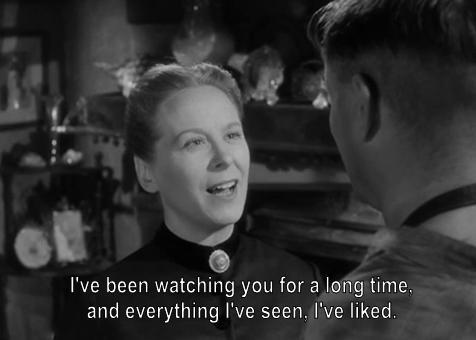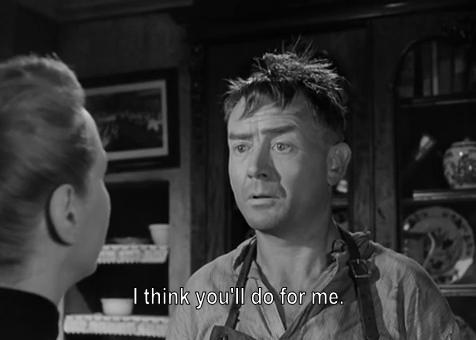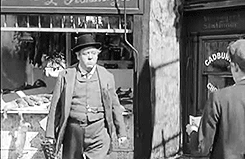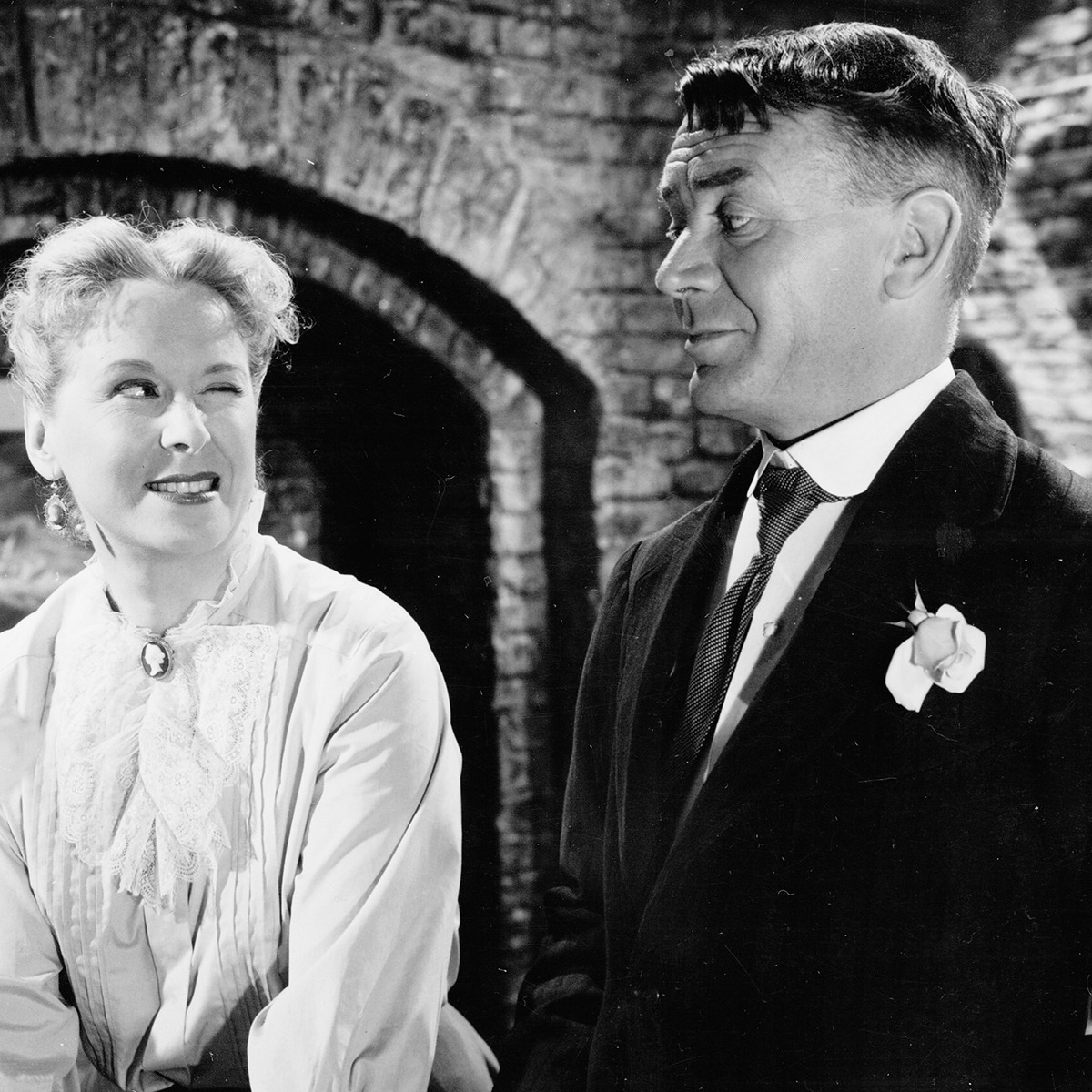A
música que acompanha os créditos iniciais dá um tom de brincadeira. Logo depois
do final dos créditos, muda o tom: há uma tempestade,e uma bota suspensa que me
fez pensar que um homem havia acabado de ser enforcado. Mas o tom não permanece
sério por muito tempo: a bota é, felizmente, apenas parte da decoração da loja
do Sapateiro Hobson. Dentro da loja, diversos sapatos das eras Vitoriana e
Eduardiana. Algumas folhas de árvore batem nas janelas, a porta da loja abre de
repente, o próprio Hobson entra, e ele arrota.
The music that accompanies the opening credits is
extremely playful. Right after the credits end, things change: there is a
storm, and a boot that made me believe was from a man who had just been hanged.
But things don't get serious for too long: the boot is, thankfully, only part
of the marquise of the Hobson Boot Maker shop. Inside of it, lots of Victorian
/ Edwardian shoes. Some tree leaves hit the window, the door opens suddenly,
enters Hobson himself, and he burps.
Henry
Hobson (Charles Laughton) gosta de bebida alcoólica, é viúvo e tem três filhas:
Alice, Vicky e Maggie. Ele decide encontrar maridos para as duas mais novas,
porque 'Maggie é útil demais para se deixar ir' – mas ele realmente quer dizer
que a) ela é como uma figura materna, que cuida dele, e b) ela é
velha demais para se casar (meu Deus, afinal, ela jé tem 30 anos!). Ah, e os
maridos que ele quer para as filhas devem ser abstêmios – eles não podem beber.
Henry Hobson (Charles Laughton) likes to drink, is a
widower and has three daughters: Alice, Vicky and Maggie. He decides to find
husbands for the two younger girls, because 'Maggie is too useful to part
with'- nah, he actually means that a) she is like a mother figure, taking care
of him, and b) she's too old to get married (OMG, she is 30!). Oh, and the
husbands he wants for his daughters must be temperance men – they can't drink.
Hobson
rapidamente desiste do plano de casamento quando ele descobre que organizar o
casamento de uma filha é um negócio caro. Ele prefere ver as filhas solteironas
e infelizes. Mas Maggie (Brenda De Banzie) não vai aceitar este destino: sendo
uma mulher esperta e prática, ela decide se casar com Willie Mossop (John
Mills), o simplório homem que fabrica botas para Hobson – mas ele é o melhor
artesão de calçados da cidade. O plano de Maggie é abrir com o marido um
negócio para fazer concorrência à loja de seu pai.
Hobson is quickly dissuaded from his marrying plan
when he learns that marrying a daughter is too expensive a business. He prefers
to see his daughters as old maids, unhappy. But Maggie (Brenda De Banzie) won't
accept this fate: as a clever and practical woman, she decides to marry Willie
Mossop (John Mills), the simple man who works for the Hobsons' as a boot maker
– the best boot maker in town, to be precise. Maggie's plan is to start a
business with her husband to rival her father's shop.
Henry
Hobson não seria considerado um bom pai nos dias de hoje – e eu imagino se ele
sequer foi considerado um bom pai em 1954. Ele explora suas filhas, fazendo-as
trabalhar para ele sem receber salário. Ele até ameaça e bate em seu
funcionário Willie. Sim, posso ver que se trata de uma comédia e Hobson pode
ser uma figura caricata, mas eu me pergunto se ainda não há homens que pensam e
se comportam como ele – e com certeza estes ogros existem.
Henry Hobson would not be considered a good father
today – and I wonder if he was considered good back in 1954. He explores his
daughters, making them work for him without receiving a wage. He even threatens
and beats his employee Willie. Yes, I can see that the film is a comedy and
Hobson may be a caricature, but I wonder if there are men who still think and
behave like Hobson – and for sure there are ogres like him in the world.
Willie
tem olhos esbugalhados, está sempre surpreso e seu corte de cabelo me faz
lembrar um dos Três Patetas. Tanto Laughton quanto Mills têm ótimos momentos
mostrando habilidades na comédia física: Laughton quando está bêbado e tenta
“pisar na Lua”, e Mills quando está se despindo para sua incomum noite de
núpcias.
Willie has his eyes wide open, very surprised, and a
weird, Stooge-like haircut. Both Laughton and Mills have great moments
showcasing physical comedy: Laughton when he is drunk and tries to “step on the
moon”, and Mills when he is undressing for his uncommon wedding night.
Você
deve ter visto Brenda De Banzie como a sequestradora em “O Homem que Sabia
Demais” (1956). A atuação dela em “Papai é do Contra” não podia ser mais
diferente do que apresenta no suspense. Maggie é uma mulher esperta que
manipula as situações para que tudo ocorra como ela deseja. Ela pode ser a
“grande mulher por trás de um (aparente) grande homem”, mas este era o único
modo que, durante séculos, as mulheres espertas tinham de conseguir o que
queriam. Aliás, seria Maggie
sufragista?
You may know Brenda De Banzie only as a child
kidnapper in “The Man who Knew Too Much” (1956). Her performance in “Hobson'
Choice” can't be more different than that. Maggie is a smart woman who manipulates
situations in order to make things go the way she wants. She may be the “great
woman behind a (seemingly) great man”, but this was the only way that, for
centuries, smart women could get what they wanted. By the
way, could Maggie be a suffragette?
Na
língua inglesa, e especialmente no Reino Unido, a expressão “Hobson's choice”
significa “uma escolha aparentemente livre em que na verdade não há
alternativa”, de acordo com o dicionário Merriam-Webster. A origem da expressão
é encontrada no final do século XVI, quando um homem que alugava cavalos
chamado Thomas Hobson decidiu que seus clientes deveriam escolher entre alugar
o cavalo que ele tinha disponível ou ficar sem cavalo. A expressão se tornou
popular com o passar dos anos e deu o nome à peça de 1915 que serviu de base
para o filme.
In the English language, and especially in the UK, the
expression “Hobson's choice” means “an apparently free choice when there is no
real alternative”, according to the Merriam-Webster dictionary. The origin of
the expression is found at the late 16th century, when a horse
rental man called Thomas Hobson decided that his costumers should choose
between renting the horse he had available for them, or no horse at all. The
expression became popular with time and named the 1915 comedy play that was the
basis for this film.
David
Lean é mais lembrado pelos grandes épicos que ele fez em Hollywood e filmou em
locação: “Lawrence da Arábia” (1962) e “Doutor Jivago” (1965). De seu período
inglês, o filme mais conhecido é o sensível drama “Desencanto” (1945), e por
isso muitas pessoas podem ter dificuldade em imaginar Lean fazendo comédia. Mas
ele podia fazê-la muito bem. Sim, o texto, a fotografia de uma Londres não
romântica e o ótimo elenco ajudam, mas não podemos negar que “Papai é do
Contra” é outra grande obra da carreira de Lean.
David Lean is best remembered by the big epics he did
in Hollywood and filmed on location: “Lawrence of Arabia” (1962) and “Doctor
Zhivago” (1965). From his English period, the best known movie is the sensitive
drama “Brief Encounter” (1945), and that's why many people have a hard time
imagining Lean doing comedy. But he could do it very well. Of course, the text,
the cinematography of a non-romantic London and the great cast help a lot, but
we can't deny that “Hobson's Choice” was another great achievement in Lean's
career.
This is my contribution to the 4th Annual British Invaders Blogathon, hosted by Terence at A Shroud of Thoughts.







4 comments:
I adore this film and really enjoyed your article on the characters and their surprising interactions. I'm sure you will encourage those who haven't yet seen Hobson's Choice to take the leap. Lovely.
Seems like I've seen this one, but I can't remember when, if I did.
I think the UK went through a Golden Age of Comedy in the Fifties and Sixties, and Hobson's Choice is an example of this. It's a very funny movie and a very fun one too! I think anyone reading your post will definitely want to see. Thanks so much for taking part in the blogathon, Le!
This is a nice write-up. I like this film a lot, the performances are excellent. And I also love the music, it is very playful. I think it's actually Malcolm Arnold's best score, I love that "wobbly" effect when he sees the moon.
Post a Comment